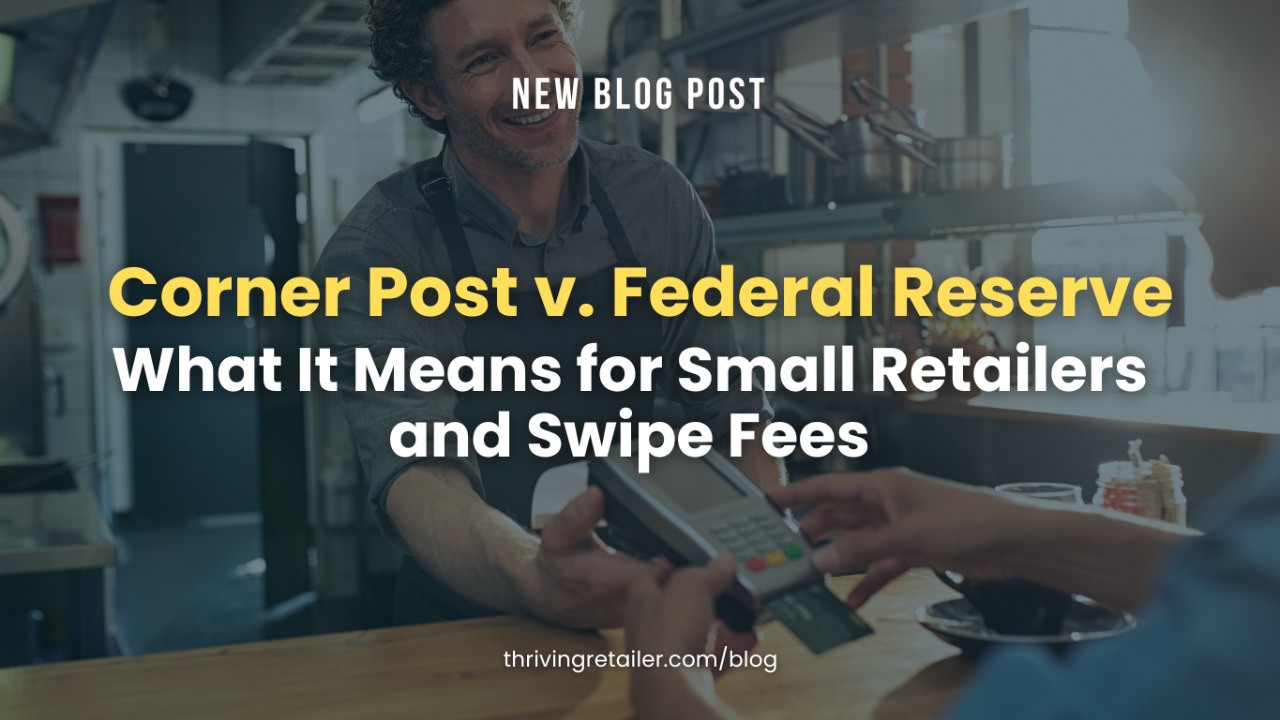Corner Post vs Federal Reserve What It Means for Small Retailers and Swipe Fees
May 23, 2025
As a retail store owner, you already know that every penny counts—especially when it comes to card processing fees. A case now before the U.S. Supreme Court—Corner Post v. Board of Governors of the Federal Reserve—could have a huge impact on the swipe fees you pay every day on debit card transactions.
And yes—this case was brought forward not by a national chain, but by a small truck stop and convenience store in North Dakota. Here’s what you need to know, and why this case matters for retailers like you.
What’s This Case Really About?
Back in 2011, the Federal Reserve set a rule capping debit card “swipe” fees at 21 cents per transaction, with a bit extra allowed for fraud prevention. This cap was based on the Durbin Amendment in the Dodd-Frank Act, which required those fees to be “reasonable and proportional” to banks’ actual processing costs.
The issue? The Fed’s own research showed banks were spending about 8 cents to process a debit card transaction. Originally, the cap was proposed at 7–12 cents. But after intense lobbying from the banking industry, the final rule set the cap significantly higher—a move many small businesses argue goes against the intent of the law.
Why Is This Back in Court Now?
Corner Post didn’t even exist when the 2011 rule was created. They opened in 2018, started accepting debit cards, and only then began to feel the impact of these higher fees. In 2021, they sued, arguing that their right to challenge the rule should start when it began to affect their business—not when it was first adopted.
So the legal question before the Supreme Court is this:
When does the countdown begin for challenging a federal rule—when it’s made, or when it starts hurting your business?
What’s at Stake?
This case could change how small businesses interact with federal regulations—especially those that have gone unchallenged for years.
If Corner Post Wins:
- Small and newer retailers could gain the right to challenge outdated or unfair federal rules, even years after they were passed.
- The Federal Reserve could be pressured to revise the current debit card fee cap, potentially reducing swipe fees across the board.
- Retailers could save money on every debit transaction—boosting margins at a time when every dollar counts.
If the Government Wins:
- The current cap remains unchanged.
- Newer businesses will have no legal path to contest rules created before they opened.
- An opportunity to align fees with actual bank processing costs would be missed.
Why It Matters for Retailers Like You
Swipe fees may not be visible to your customers, but they’re eating into your profit every day. U.S. retailers pay billions annually in card processing fees, often without a fair say in how those fees are set.
This case offers a rare chance to rebalance the playing field—to give smaller businesses a voice and push for regulations that make sense in today’s retail environment.
It’s also a powerful reminder that small businesses aren’t powerless. When one independent store speaks up, it can pave the way for meaningful industry-wide change.
What’s Next?
The Supreme Court heard oral arguments in May 2025, and a decision is expected later this year. As this case develops, we’ll continue to keep you updated through the Thriving Retailer blog and newsletter.
Stay tuned. Policy shifts like this could significantly impact your store’s bottom line.
 “Don’t underestimate how small changes in cost—like swipe fees—can quietly erode your margins over time. Stay informed, stay proactive, and always fight for tools and policies that help you grow. When margins are tight, clarity is power.”
“Don’t underestimate how small changes in cost—like swipe fees—can quietly erode your margins over time. Stay informed, stay proactive, and always fight for tools and policies that help you grow. When margins are tight, clarity is power.”
At Thriving Retailer, we help independent retailers simplify operations, grow profits, and confidently step into the future of retail.
Explore our Blueprint for Success Course for strategies to boost margins and reclaim your time, or book a 1-on-1 coaching with Rachael to bring calm and clarity to your daily operations.
Let’s make retail feel like a win again.


